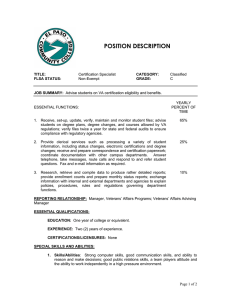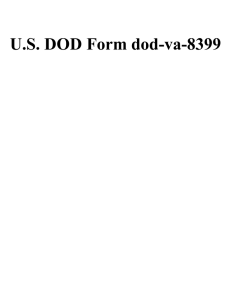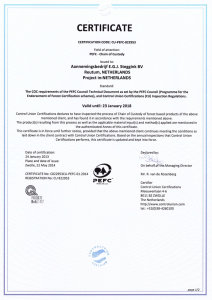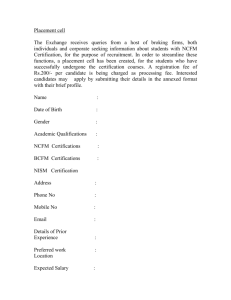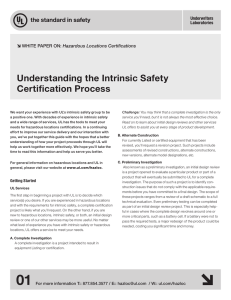Understanding the Intrinsic Safety Certification Process
advertisement
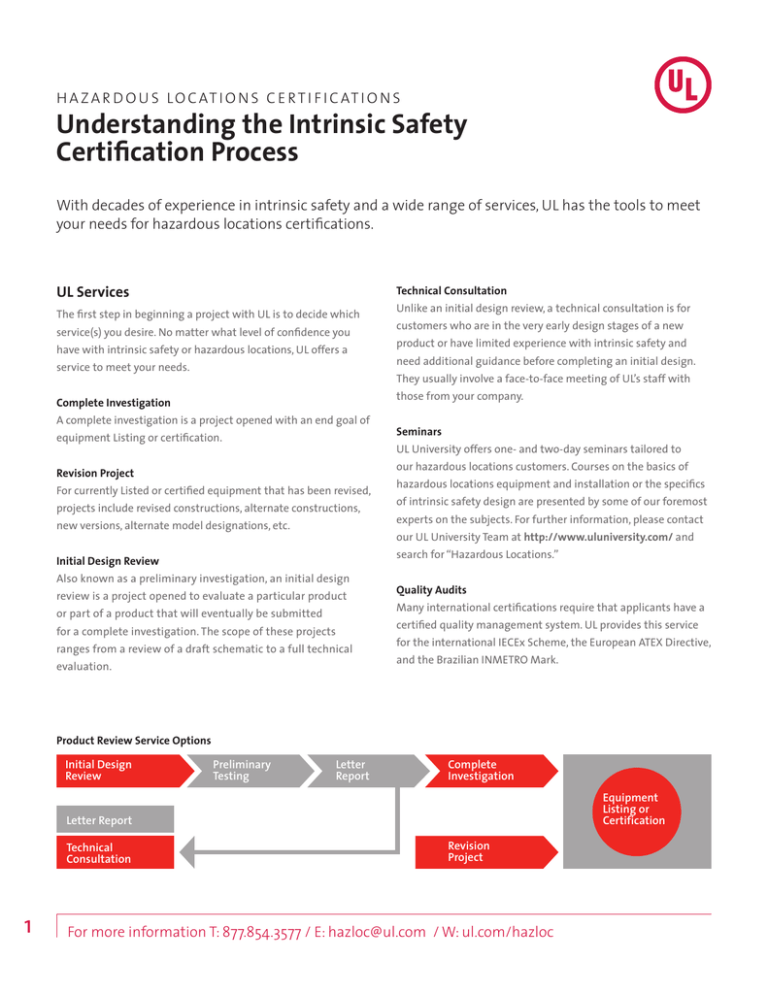
h a z a r d o u s l o c at i o n s c e r t i f i c at i o n s Understanding the Intrinsic Safety Certification Process With decades of experience in intrinsic safety and a wide range of services, UL has the tools to meet your needs for hazardous locations certifications. UL Services Technical Consultation The first step in beginning a project with UL is to decide which service(s) you desire. No matter what level of confidence you have with intrinsic safety or hazardous locations, UL offers a service to meet your needs. Unlike an initial design review, a technical consultation is for customers who are in the very early design stages of a new product or have limited experience with intrinsic safety and need additional guidance before completing an initial design. They usually involve a face-to-face meeting of UL’s staff with those from your company. Complete Investigation A complete investigation is a project opened with an end goal of equipment Listing or certification. Seminars UL University offers one- and two-day seminars tailored to our hazardous locations customers. Courses on the basics of Revision Project For currently Listed or certified equipment that has been revised, projects include revised constructions, alternate constructions, new versions, alternate model designations, etc. hazardous locations equipment and installation or the specifics of intrinsic safety design are presented by some of our foremost experts on the subjects. For further information, please contact our UL University Team at http://www.uluniversity.com/ and search for “Hazardous Locations.” Initial Design Review Also known as a preliminary investigation, an initial design review is a project opened to evaluate a particular product or part of a product that will eventually be submitted for a complete investigation. The scope of these projects ranges from a review of a draft schematic to a full technical evaluation. Quality Audits Many international certifications require that applicants have a certified quality management system. UL provides this service for the international IECEx Scheme, the European ATEX Directive, and the Brazilian INMETRO Mark. Product Review Service Options Initial Design Review Preliminary Testing Letter Report Complete Investigation Equipment Listing or Certification Letter Report Technical Consultation 1 Revision Project For more information T: 877.854.3577 / E: hazloc@ul.com / W: ul.com/hazloc Certifications UL can provide One of the most important pieces of information that UL needs to know in order to effectively handle your needs is the certification(s) desired for your product. Since this is often confusing, following is a brief summary of the certifications that UL’s intrinsic safety group can provide. For the United States: UL Listing or UL Classification — For complete devices ready for installation. Both are considered “Listed” by an NRTL (Nationally Recognized Testing Laboratory), which is required by the National Electrical Code for all intrinsically safe equipment and associated apparatus. A UL Classification denotes that some aspects of the safety of the device have not been evaluated to the level required for a Listing. For example, Classified gas detectors are not subjected to a complete performance test program as Meeting locations • Meeting at your facility — Some customers appreciate that their entire design team can participate when we visit your facility, allowing everyone involved to hear how their work affects the overall certification (and get their specific questions answered too!). We can even send a team of UL staff to your facility to work with you — a common approach for those customers who need expedited service. • Meeting at UL — Many customers find this to be an invaluable service, since they can get immediate feedback on their questions, or propose alternate constructions on the fly until a feasible solution is found. Listed ones are. UL Recognized Component — For components that are incomplete. Common examples are relays, optical isolators, transformers, and fuses. For Canada: c-UL Listing or c-UL Classification — Same as UL Listing or UL Classification, but for Canada. c-UL Recognized Component — Same as UL Recognized Component, but for Canada. For Europe: ATEX Certificate of Conformity — For complete devices ready for installation. ATEX Certificate of Component — For components. For the international IECEx Scheme: Hazardous Locations (Ex) Test Reports (ExTR) IECEx Scheme Certificate of Conformity — For complete equipment. IECEx Scheme Certificate of Component — For components. IECEx Scheme Quality Assessment Report — Required for manufacturers of intrinsically safe equipment and associated apparatus before an IECEx Certificate of Conformity or Component can be issued for a product. Others: For Brazil — INMETRO Certification For Japan — TIIS Certification ATEX Production Quality Assurance Notification Certificate — Required for manufacturers of intrinsically safe equipment and associated apparatus before the CE Mark can be affixed on the product. May be requested by the Notified Body for verification before a Certificate of Conformity or Component is issued for a product. 2 For more information T: 877.854.3577 / E: hazloc@ul.com / W: ul.com/hazloc Project Flow Project Opened Planning Provide Samples Initial Assessment Preliminary Review Project closed due to noncompliance or inactivity Certification(s) Awarded Final Review and Processing Project flow Once a quote has been accepted and the preliminary deposit has been received, a project will be opened and passed to the appropriate conformity assessment group(s), where a project Documentation and Testing Initial assessment The handler evaluates the product to the requirements applicable to the certifications requested. For intrinsic safety, the major parts of this assessment are: plan will be generated. • Determination of Power Sources Project planning • Determination of Protective Components and Protective Component Assessment and standard(s) to be used and to prepare a test program, a list • Spark Ignition Assessment Each project goes through a planning stage to confirm the scope of samples and information required, and project assumptions. Providing samples Instructions for providing samples to UL will be included with the project plan. Turnaround time Our turnaround times are based on the complexity of the project, the certifications desired, and when the project includes testing, the current backlog of our laboratory. As of August 31, 2008, our current turnaround times for intrinsic safety projects are: • Minor revision: 2 weeks • Normal revision without testing: 4 weeks • Normal revision with testing, or complex revision: 7 weeks • Normal complete investigation: 11 weeks • Complex complete investigation: 16 weeks Please note that projects including international certifications will take longer due to the need for review by the Certification Body who issues the certificate. For ATEX or IECEx projects, add two weeks. Others, e.g. INMETRO, will vary. 3 Post Test Assembly • Thermal Ignition Assessment • Construction Examination • Documentation Review Once the handler has completed these tasks, he or she requests a preliminary review of their work. Requesting a Quote Once you have decided which UL service and certifications you desire, you may request a quote by going to http://my.home1. ul.com/portal/page/portal/PSR/HazLoc and following the directions posted there. A cost quote will be provided to you from our Customer Service or Sales staff. This quote will contain only information about the cost of the requested service; other project specifics will be provided in the project planning stage. Preliminary review There are two formal reviews that take place during the course of a project: preliminary review and final review. At this time, you will be provided with the finalized initial assessment status communication that the handler drafted during the initial assessment. Projects that are on track move forward to the Documentation and Testing stage. For more information T: 877.854.3577 / E: hazloc@ul.com / W: ul.com/hazloc Documentation and testing Following preliminary review for projects requiring testing, tests How noncompliance issues affect your project to draft the paperwork to support the certification(s). If the Due to the complexity of the applicable requirements, are submitted to the laboratory, and the project handler begins project does not involve testing, this stage is skipped. Post test assembly Once the project handler verifies that all test results are acceptable and that any open issues have been addressed, the handler then completes all certification documentation and prepares the project for final review. Final review and processing Once a qualified reviewer has verified that the product complies with the applicable requirements, the project moves on to final processing, where the UL Follow-Up Services Procedure and Report are officially issued and the products are added to our published directories. This also marks the point where projects involving international certifications move on to the appropriate certification body for issuance of a Certificate of Conformity or Component. 4 compliance issues arise during many intrinsic safety projects. We classify these as “minor” or “major”. • Minor — A minor issue is one that you can address in a reasonable amount of time, and does not require significant reevaluation of the device. Examples are making corrections to drawings, reductions in capacitance to address spark ignition concerns, alternate protective component values to address spark ignition concerns, and small trace layout changes to address simply spacing concerns. • Major — A major issue is one that will require significant redesign of the device or its subassemblies, and therefore, a partial or complete reevaluation of the device from an intrinsic safety standpoint will be needed. When a major design issue is discovered, we strongly recommend that your project be closed until you have addressed the concern(s) and redesigned the device to bring it into compliance with the requirements. For more information T: 877.854.3577 / E: hazloc@ul.com / W: ul.com/hazloc Copyright © 2011 UL 02/11 BDI 080937-1
